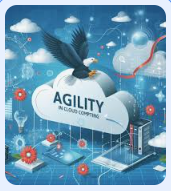
About Cloud Computing?
Cloud computing is the utilization of services provided by a third-party, where data storage, servers, databases, networking, and software are accessed over the internet. The physical servers responsible for storing the data are managed by a cloud service provider. In cloud computing, computer system resources, including data storage and computing power, can be accessed as needed without the user having to directly oversee their management.
Why we use Cloud Computing?
Cloud computing is being utilized by organizations across various sectors for different purposes, including data backup, disaster recovery, email services, virtual desktops, software development and testing, big data analytics, and customer-facing web applications.
Healthcare companies are leveraging the cloud to create customized treatment plans for patients, while financial services companies are utilizing it for real-time fraud detection and prevention.
Video game developers are harnessing the power of the cloud to provide online gaming experiences to a global audience of millions of players.
Advantage of Cloud Computing?

Agility
The cloud provides convenient access to a wide array of technologies, enabling you to accelerate innovation and create virtually anything you can envision. You have the ability to rapidly deploy resources as required, ranging from infrastructure services like computing, storage, and databases, to Internet of Things, machine learning, data lakes, analytics, and beyond.
Version 1: With the ability to deploy technology services within minutes, you can now accelerate the process of going from idea to implementation by several orders of magnitude compared to the past. This newfound speed grants you the flexibility to experiment, explore new concepts to enhance customer experiences, and revolutionize your business.

Cost-Saving
The cloud enables you to exchange fixed costs, like data centers and physical servers, for flexible expenses, where you only pay for IT services as you use them. Moreover, the variable expenses are significantly lower compared to the costs you would incur if you were to handle it on your own, thanks to the advantages of economies of scale.
flexibility
Cloud computing allows you to avoid over-provisioning resources in advance for potential spikes in business activity. Instead, you can provision only the necessary amount of resources. This flexibility enables you to easily adjust resource levels to match your evolving business requirements.

flexibility
Leveraging cloud technology enables businesses to quickly scale into different geographical areas and establish a global presence within minutes. Take AWS for instance, with its widespread infrastructure, allowing users to effortlessly deploy applications across various physical locations with minimal effort. Placing applications closer to end users not only decreases latency but also enhances overall user experience.


Types of Cloud Computing
There are three primary categories of cloud computing, namely Infrastructure as a Service (IaaS), Platform as a Service (PaaS), and Software as a Service (SaaS). Each category offers varying degrees of control, flexibility, and management, allowing you to choose the most suitable range of services based on your requirements.

Iaas(Infrastructure as a Service)
The platform offers scalable and virtualized computing resources such as servers, storage, and networking via the internet. Users are granted complete control over the infrastructure, allowing for customization and management access to virtual machines, storage, and networking elements.

Paas(Platform as a Service)
Platform as a Service (PaaS) eliminates the requirement for managing the underlying infrastructure, typically hardware and operating systems. Instead, it enables you to concentrate on deploying and overseeing your applications. This streamlines your operations by relieving you of concerns such as resource acquisition, capacity forecasting, software upkeep, updates, and other routine tasks associated with maintaining your application.

Saas(Software as a Service)
Software as a Service (SaaS) offers a fully managed product provided by the service provider. Typically, when discussing SaaS, individuals are talking about end-user applications like web-based email. By opting for a SaaS solution, users are relieved from concerns regarding service maintenance and infrastructure management, allowing them to focus solely on utilizing the software itself.
Data Security
Data security is crucial for a company to protect sensitive information from unauthorized access and breaches. It ensures confidentiality and integrity, which helps maintain customer trust. Additionally, it helps companies comply with legal and regulatory requirements, prevent financial losses, and maintain a competitive edge.
Good data security measures reduce the risks of cyber threats and data breaches, preserving the company's reputation and ensuring smooth operations. Implementing robust security protocols not only safeguards valuable data but also enhances overall business continuity and resilience in the face of potential cyber threats.
Data security is crucial for companies for several reasons:
»» More Details

